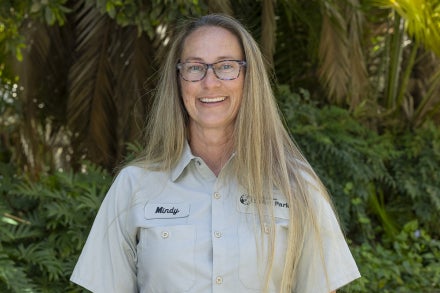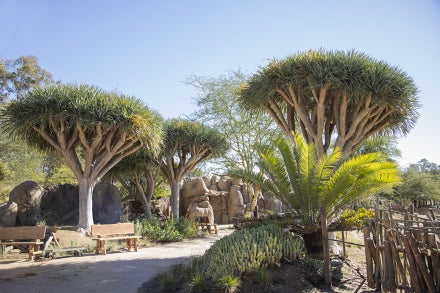FOR IMMEDIATE RELEASE
CONTACT:
San Diego Zoo Wildlife Alliance
Public Relations
619-685-3291
publicrelations@sdzwa.org
sdzwa.org
NEWS RELEASE
“Toss the Tusk” Event Held at San Diego Zoo Safari Park
Event Helped Raise Awareness of Elephant Poaching Crisis and Illegal Ivory Trade
SAN DIEGO (March 3, 2023) – San Diego Zoo Wildlife Alliance hosted a “Toss the Tusk” event at the San Diego Zoo Safari Park earlier today, to help raise awareness about the devastating effects of elephant poaching. The event, organized by the Association of Zoos and Aquariums’ Wildlife Trafficking Alliance (AZA WTA) and the U.S. Fish and Wildlife Service (USFWS), encouraged the public to surrender unwanted ivory products to help ensure that their availability will not drive demand for the product.
The event kicked off with Paul A. Baribault, president and chief executive officer, San Diego Zoo Wildlife Alliance, welcoming special guest California Senate President pro Tempore Toni G. Atkins and representatives from the Association of Zoos and Aquariums, U.S. Fish and Wildlife Service and California Department of Fish and Wildlife Service, who shared information about the critical work being done to end illegal wildlife trafficking.
“Conservation is a team effort, and we are so pleased to host our conservation partners for Toss the Tusk, an incredibly important event highlighting wildlife trafficking and the challenges facing elephants,” said Baribault. “Moments like these create hope for Earth’s gentle giants—the landscape engineers of our shared ecosystem—and remind us that we can all play a role in securing a future for elephants and wildlife worldwide.”
During the daylong “Toss the Tusk” event, guests had the opportunity to meet U.S. Fish and Wildlife Service and California Department of Fish and Wildlife law enforcement staff, who shared information about elephant conservation and illegal wildlife trade. Law enforcement detection canines were also present, and examples of ivory products were on display.
San Diego Zoo Wildlife Alliance scientists participated in the event, providing details about the Alliance’s deep commitment to the protection and conservation of African savanna elephants. That work includes supporting efforts in Kenya led by local communities, to promote coexistence between people and elephants using wildlife health and science applications.
San Diego Zoo Wildlife Alliance partners with Save the Elephants, a nonprofit conservation organization based in Kenya, to conserve elephants in Africa. “We congratulate the organizers of the ‘Toss the Tusk’ event for encouraging Americans to surrender their ivory,” said Frank Pope, chief executive officer, Save the Elephants. “While poaching has been reduced across much of Africa’s continent, the illegal ivory trade remains an ever-present threat to elephants. If people continue to value ivory, poachers will continue to kill elephants.”
Worldwide demand for ivory is decimating elephant populations and supporting international criminal syndicates around the globe. Thousands of elephants are killed each year for their ivory. As a result, African elephant populations have decreased from an estimated 12 million a century ago to around 415,000 individuals remaining in 2016. Due to global conservation efforts, poaching rates have been slightly, yet steadily, declining over the past few years across Africa. However, elephants are being lost faster than they can reproduce.
International commercial trade in elephant ivory is prohibited under the Convention on International Trade in Endangered Species (CITES). In the United States, elephants are protected by the Endangered Species Act of 1973. The African Elephant Conservation Act and other laws further restrict the ivory trade. In 2016, a near-total ban on the commercial trade of African elephant ivory went into effect in the United States.
California Assembly Bill 96—legislation introduced by Sen. Atkins—prohibits the import and sale of elephant ivory and rhino horns in the state of California. Though the state has prohibited the sale of ivory since 1977, a loophole rendered the law unenforceable. AB 96 closed that loophole, and allows the California Department of Fish and Wildlife to enforce the law. California is the one of the largest markets for the sale of illegal ivory in the United States.
However, none of these regulations restrict the personal possession of ivory. If individuals already own ivory, such as an heirloom carving that has been passed down in a family or a vintage musical instrument with ivory components, they can still legally own those pieces. By surrendering elephant ivory, individuals can ensure that these products will never be made available for sale. Removing ivory products from the market can keep elephants alive for generations to come.
African savanna elephants are currently listed as Endangered on the International Union for Conservation of Nature (IUCN) Red List of Threatened Species and face many threats in their native habitats, including poaching, habitat loss and fragmentation, challenges to human-elephant coexistence and competition for resources. Elephants are important in maintaining ecosystems, benefiting other wildlife and people.
For decades, conserving African elephants has been a high priority for San Diego Zoo Wildlife Alliance. Scientific studies conducted in the field in Africa and with the elephant herds at the San Diego Zoo and Safari Park provide a unique opportunity to increase the understanding of the species and, working with partners in Kenya, help develop conservation solutions that can be applied in elephants’ native habitats.
In addition to the Toss the Tusk event at the Safari Park, AZA WTA and USFWS will hold two additional Toss the Tusk events in 2023: at Dallas Zoo on April 14 and at the Saint Louis Zoo on Aug. 11. For more information, visit https://www.aza.org/wta-toss-the-tusk.
###
About San Diego Zoo Wildlife Alliance
San Diego Zoo Wildlife Alliance is a nonprofit international conservation leader, committed to inspiring a passion for nature and working toward a world where all life thrives. The Alliance empowers people from around the globe to support their mission to conserve wildlife through innovation and partnerships. San Diego Zoo Wildlife Alliance supports cutting-edge conservation and brings the stories of their work back to the San Diego Zoo and San Diego Zoo Safari Park—giving millions of guests, in person and virtually, the opportunity to experience conservation in action. The work of San Diego Zoo Wildlife Alliance extends from San Diego to eco-regional conservation “hubs” across the globe, where their expertise and assets—including the renowned Wildlife Biodiversity Bank—are able to effectively align with hundreds of regional partners to improve outcomes for wildlife in more coordinated efforts. By leveraging these skills in wildlife care and conservation science, and through collaboration with hundreds of partners, San Diego Zoo Wildlife Alliance has reintroduced more than 44 endangered species to native habitats. Each year, San Diego Zoo Wildlife Alliance’s work reaches over 1 billion people in 150 countries via news media, social media, their websites, educational resources and the San Diego Zoo Wildlife Explorers television programming, which is in children’s hospitals in 13 countries. Success is made possible by the support of members, donors and guests to the San Diego Zoo and San Diego Zoo Safari Park, who are Wildlife Allies committed to ensuring all life thrives.
About the Association of Zoos and Aquariums (AZA)
Founded in 1924, the Association of Zoos and Aquariums is a nonprofit organization dedicated to the advancement of zoos and aquariums in the areas of conservation, animal welfare, education, science and recreation. AZA is the accrediting body for the top zoos and aquariums in the United States and eight other countries. Look for the AZA accreditation logo whenever you visit a zoo or aquarium as your assurance that you are supporting a facility dedicated to providing excellent care for animals, a great experience for you and a better future for all living things. The AZA is a leader in saving species and your link to helping animals all over the world. To learn more, visit aza.org.
About AZA’s Wildlife Trafficking Alliance (WTA)
The Wildlife Trafficking Alliance is a coalition of over 90 nonprofit organizations, companies, and AZA-accredited zoos and aquariums, working together to combat illegal wildlife trade around the world. To learn more, visit aza.org/wildlife-trafficking-alliance.
About the U.S. Fish & Wildlife Service (USFWS)
The U.S. Fish and Wildlife Service works with others to conserve, protect and enhance fish, wildlife, plants and their habitats for the continuing benefit of the American people. For more information, visit www.fws.gov, or connect with us through any of these social media channels: Facebook, Twitter, YouTube and Flickr. If you encounter potential wildlife crime, please report it to the Service’s wildlife trafficking tips line at 1-844-FWS-TIPS (397-8477) or online at: Wildlife Crime Tips. If your tip leads to an arrest, or other substantial action, you may receive a financial reward.



